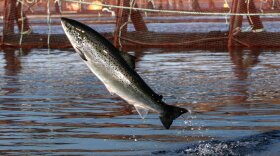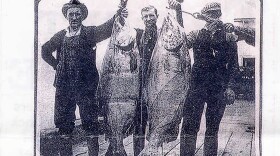John Ryan
-
The Quinault Indian Nation in Washington state is gradually moving the village of Taholah away from a rising Pacific Ocean. Other communities in the U.S. may need to take a similar approach.
-
This brings the total of reported attacks on the Northwest power grid to 10 since November. Attacks on substations in the Pacific Northwest have heightened concerns about grid vulnerabilities.
-
The consulate closes Friday under orders from the White House. In addition, 60 Russian officials are being expelled from the U.S. because of the poisoning of a Russian ex-spy and his daughter.
-
The move comes seven months after an ill-fated fish farm collapsed, releasing as many as 250,000 of the nonnative fish into areas where wild Pacific salmon are already struggling to survive.
-
Historical photos show fishermen with chinooks almost as tall as they are. A century's worth of dam-building, overfishing, habitat loss and hatcheries has cut the size of the average fish in half.
-
Officials blame the failure of a pen near Washington's Cypress Island on high tides caused by the eclipse, but that is being questioned. Fishing boats are scrambling to catch as many as possible.
-
Member station KUCB tagged along with a meteorologist at one of America's most remote weather stations. This story originally aired on Dec. 22, 2015, on All Things Considered.
-
Even with vacancies, most Seattle shelters don't let families stay right away. A system designed to alleviate homelessness has resulted in a bottleneck that leaves families on the streets for longer.
-
In Seattle — one of the nation's wealthiest cities — homelessness has surged over the past decade. More people are now homeless in Seattle than anywhere except New York City, Los Angeles or Las Vegas.
-
Workers at U.S. oil refineries die on the job about three times as often as their counterparts in Europe. When accidents do kill American workers, the companies they work for rarely pay a heavy price.







